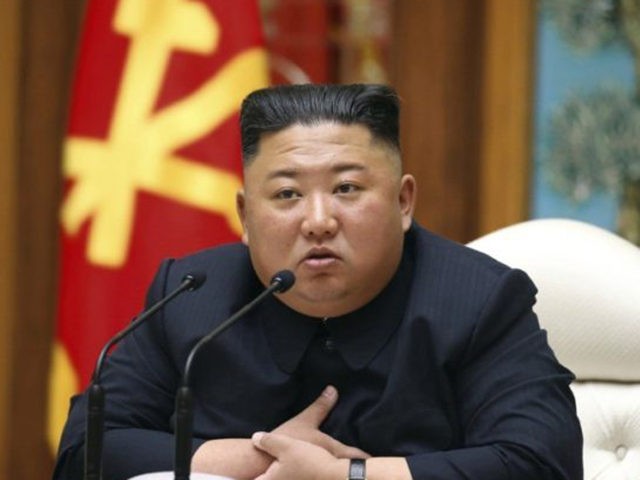North Korean dictator Kim Jong-un called for “urgent action” on climate change at a meeting of his Politburo on Thursday, blaming “disastrous weather” brought on by climate change for North Korea’s food shortages.
According to North Korea’s state-run Korean Central News Agency (KCNA), Kim’s address to the Politburo put land management, food shortages, and the “global health crisis” at the top of the agenda.
In his usual rambling fashion, Kim hinted that land use policies could be improved a bit – and chided unnamed local officials for not following central policy properly – but he held Communist central planning and ideology largely blameless for North Korea’s food crisis. Instead, he blamed climate change, and by extension the rest of the world for not doing enough to address it:
He called on the Party organizations and power organs in the provinces, cities and counties to be well aware of the importance and urgency of the land management and the demand of the Party Central Committee at the present time and go all out for implementing the Party’s policy on land management.
What is more important than anything else is to maintain the viewpoint and attitude of setting forth the land management as the most priority task in carrying out the Party’s economic policy and concentrating efforts on it, he said, adding that it is urgent to practically uproot even a single underlying dangerous factor obstructing socialist construction at present.
Saying that the viewpoint and attitude on the land management is directly linked with the attitude of defending the Party and the revolution and the attitude of loving the state and the people under the situation where the disastrous weather is getting ever more pronounced worldwide and our country is also lying vulnerable to its danger, he asked all the senior province, city and county officials to bear in mind that no success can be expected in their work without the land management and to pay the closest attention to it.
Kim also blamed the coronavirus pandemic, which North Korea officially insists has never spread to its population, but Kim pointed to global economic disruptions caused by Covid-19 as one reason for North Korea’s food shortages.
Saying that the present dangerous situation of the worldwide pandemic which keeps spiraling out of control demands tighter nationwide epidemic prevention, he emphasized that all the Party organizations and officials should reexamine the national epidemic prevention system and the work in this field, and conduct an intense political offensive to strain and awaken the epidemic prevention front once again.
As recently as last month, the Kim regime insisted it had zero coronavirus cases, despite claiming to have tested almost 36,000 people. North Korea ostentatiously refused three million doses of Chinese coronavirus vaccine donated through the international COVAX program last week, saying nations with more infected people should receive the medicine instead.
However, a furious Kim sacked several of his senior officials after a mysterious “crucial” incident involving Covid-19 in July.
A general named Pak Jong-chon who was reprimanded, and possibly demoted, by Kim after the July incident was surprisingly promoted to become presidium of the Workers’ Party of Korea (WPK) on Tuesday.
Pak was a rising star in the North Korean military whose career seemed to have stumbled after the “great crisis” that angered Kim in July. His portfolio included leadership in North Korea’s short-range missile program, while the general he replaced as presidium was associated with long-range ballistic missile development, so Pak’s elevation to a top position in the ruling Communist party could signal a shift in North Korean military development strategy.
Kim publicly acknowledged in June that North Korea is facing a “tense” food shortage, which he metaphorically compared to the severe famine of the 1990s by calling for an “Arduous March” to overcome it. He blamed flooding from last year’s typhoons for preventing the Communist nation’s tightly-controlled agricultural sector from meeting its targets.
Kim also boasted of North Korea’s rising industrial output in June, suggesting that whatever worldwide action he demands against climate change will not involve cutting back North Korea’s production or pollution by much.
The Kim regime is also unlikely to cut back on its deranged levels of military spending or scale back weapons programs with huge carbon footprints. In fact, operations reportedly resumed at North Korea’s Yongbyon plutonium reactor last week. Operations were suspended in 2018 under the Trump administration.
North Korea released its emergency military rice reserves in early August to hold off mass starvation, according to reports from South Korea’s intelligence agency. South Korean intelligence believes the North’s military rice reserve is not large enough to feed the general population for long, especially if pandemic-related border shutdowns remain in effect.

COMMENTS
Please let us know if you're having issues with commenting.